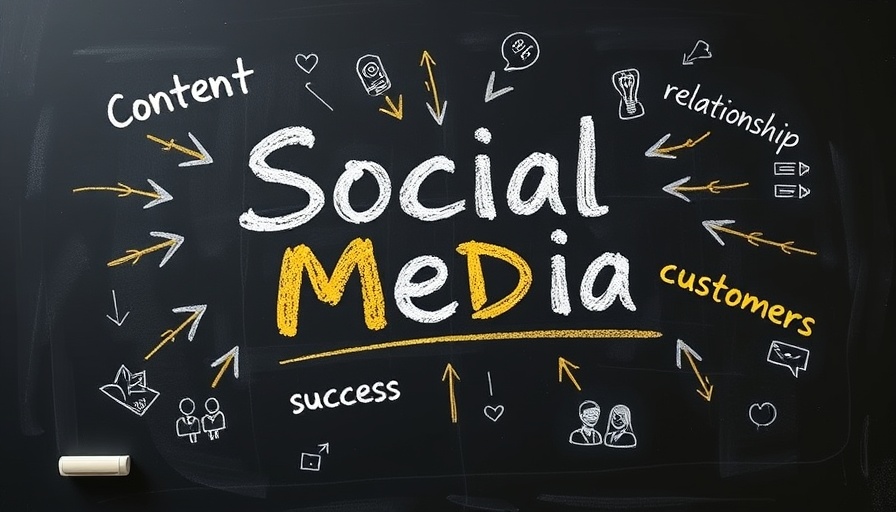
Understanding the Power of Social Media in Tourism
The tourism landscape in 2025 is undergoing a significant transformation, driven by the digital revolution and an increasing demand for sustainable travel. As travelers become more discerning, tourism brands are leaning heavily into social media, not just as a marketing tool, but as a central pillar of their engagement strategies. Today's consumers are looking for brands that reflect their values, making social media a vital avenue for authentic connections.
The Rise of AI-Powered Personalization
Artificial intelligence (AI) is reshaping how travel brands interact with potential customers on social media. This technology is no longer merely about automated responses; it’s revolutionizing content creation and engagement. For example, advanced chatbots are not only handling multilingual inquiries around the clock but also providing personalized responses based on user behavior. Imagine speaking to a virtual assistant that knows you well enough to suggest destinations based on your past travels or preferences.
A notable case involves the German Tourist Board, which has introduced AI avatars like Lena and Emma to create a more relatable experience for potential travelers on social media platforms. This form of engagement fits perfectly into the narrative of sustainable tourism: showcasing not just destinations but also engaging travelers with authentic, humanized brand interactions.
Authenticity Matters: Ethically Engaging Messaging
As consumers prioritize ethical consumption, tourism brands must align their marketing strategies with genuine values. In 2025, empty green claims will not suffice. Successful brands are those that transparently share their sustainability efforts along with powerful stories from their team. For instance, Transavia and Singapore Airlines are leading the charge by offering "day in the life" glimpses of their crew members, spotlighting their commitment to environmental responsibility. This kind of authentic content not only builds trust but also resonates deeply with the values of socially conscious travelers.
The Evolution of Social SEO: Searching Beyond Google
In this rapidly changing landscape, social platforms like TikTok and Instagram are emerging as new search engines, altering how travelers plan their journeys. Brands are now optimizing content not solely for websites but for these social channels. The shift toward social SEO requires tourism brands to adapt their strategies by creating engaging, visually captivating content that answers travelers' common queries.
For example, brands can produce lists like "Top 5 Eco-Friendly Destinations" and employ SEO techniques such as using relevant keywords and engaging visuals. The algorithms on these platforms increasingly favor rich, downloadable content, meaning that brands must step up to meet this new demand. This content encourages engagement earlier in the travel planning phase, ultimately translating into higher booking rates.
The Impact of Traveler-Generated Content
In an era where authenticity is king, traveler-generated content and endorsements from micro-influencers are proving more effective than traditional advertisements. Potential travelers are more likely to trust a fellow travel enthusiast's review than a polished promotional video from a large company. For instance, brands that encourage customer reviews and feature genuine experiences are not just enhancing their credibility; they’re forming a community of shared values around sustainability.
Incorporating user-generated content into marketing strategies can create a robust platform for fostering community engagement. Features like traveler stories on online platforms or IG highlights enhance trust with an audience increasingly skeptical of corporate messages.
Looking Ahead: Future Trends in Sustainable Tourism Marketing
As we move further into the digital age, upcoming trends in tourism marketing will continue to emphasize sustainability, authenticity, and community engagement. Brands that prioritize ethical practices and innovative social media strategies will likely rise above the competition. Moreover, the integration of technology—be it chatbots for real-time engagement or AI for content creation—will become increasingly essential in crafting personalized marketing experiences.
As we embrace these changes, the tourism industry has an opportunity to forge deeper connections with travelers who share their values. Future marketing strategies must foster a sense of belonging and responsibility, further paving the way for responsible tourism. Sustainable travel is not just a trend—it's becoming an integral part of the global tourism narrative, encouraging ethical engagement at every level.
Get Involved in Sustainable Travel
As an aspiring traveler or someone passionate about sustainability in tourism, it’s essential to support brands that align with ethical practices. Take the initiative to research and choose travel companies that prioritize sustainability, and help spread the word about responsible tourism practices. By doing so, you're contributing positively to the future of travel. Let's advocate for a world where tourism respects our planet and uplifts local communities.
 Add Row
Add Row  Add
Add 




Write A Comment